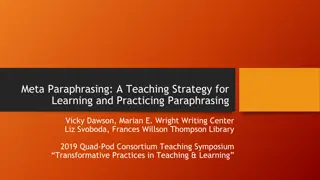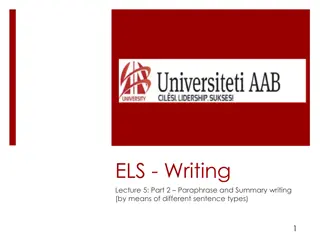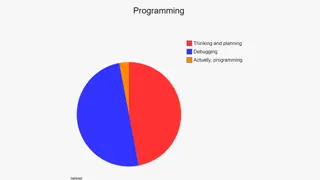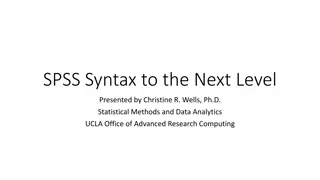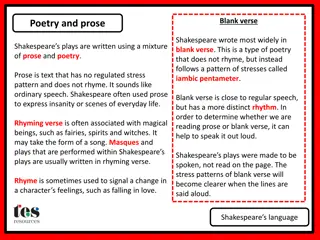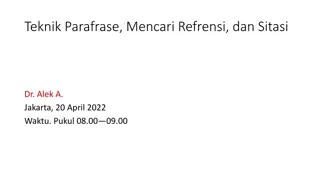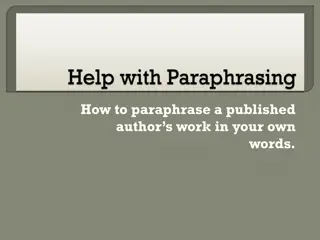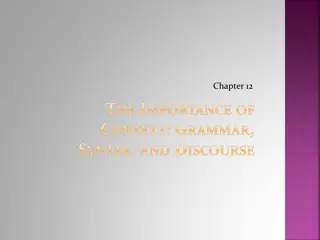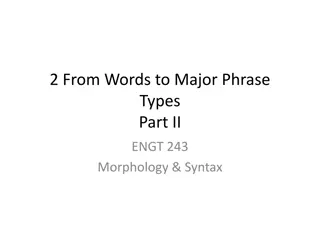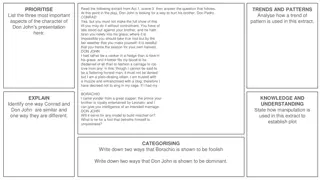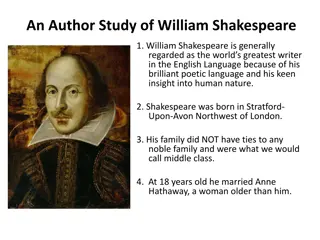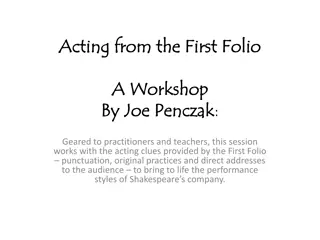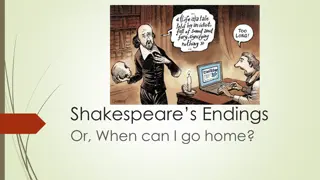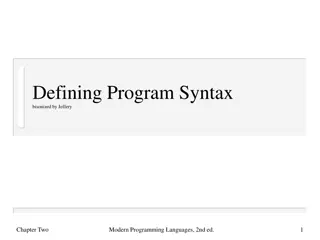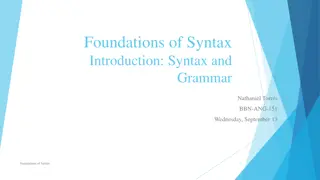Exploring Shakespeare's Plays: Paraphrasing and Analyzing Syntax
Dive into Shakespeare's plays by transforming lines into the common S-V-O pattern, analyzing how suffixes impact word function, and practicing comprehension strategies like paraphrasing. Discover how dialogue and incidents in plays reveal character aspects and propel action as intended by Shakespeare himself.
Download Presentation

Please find below an Image/Link to download the presentation.
The content on the website is provided AS IS for your information and personal use only. It may not be sold, licensed, or shared on other websites without obtaining consent from the author. Download presentation by click this link. If you encounter any issues during the download, it is possible that the publisher has removed the file from their server.
E N D
Presentation Transcript
Bellringer: Lets Review Invert each lines from Shakespeare s plays into the common S-V-O pattern (on slides 1 & 2). Be ready to share out. Lines from Hamlet Inverted to S-V-O pattern. Queen Gertrude: Hamlet, thou hast thy father much offended. Hamlet: Mother, you have my father much offended.
Bellringer: Lets Review Lines from Antony & Cleopatra Inverted to S-V-O pattern. Antony: I must from this enchanting queen break off;/ Ten thousand harms, more than the ills I know,/ My idleness doth hatch. Now paraphrase it!
This weeks activity Changing words Though suffixes don t alter a words meaning, they do have an important job. Suffixes change how a word functions in a sentence.
Process Step 1 Choose a step 3 word Step 2 Change the words suffixes to create new forms of the word Step 3 Construct a sentence with at least 3 variations of the word. The sentence context should remain the same, focus on moving the word repeat Do this 3 times.
Outcome: I can comprehend complicated texts by paraphrasing and analyzing syntax. I can analyze how: dialogue or incidents in a play propel action, reveal aspects of character, or provoke a decision.
How did Shakespeare intend for his works to be experienced?
Comprehension Strategies: Paraphrase I can comprehend complicated texts by paraphrasing and analyzing syntax. Shakespearan Text My Paraphrase What say you, Hermia? Be advised, fair maid. To you, your father should be as a god,/ One that composed your beauties, yea, and one/ To whom you are but as a form in wax/ By him imprinted, and within his power/ Demetrius is a worthy gentleman.
Comprehension Strategies: Paraphrase I can comprehend complicated texts by paraphrasing and analyzing syntax. Shakespearan Text A soliloquy from Act I, scene I Stand forth, Lysander: and my gracious duke,/ This man hath bewitch d the bosom of my child;/ Thou hast given her rhymes,/ And interchanged love tokens with my child./ My Paraphrase
Independent: Priority: Work with a peer to finish paraphrasing Egeus soliloquy. Turn in Step 3 vocabulary. Finish AECR response *Due at end of class; however, if you are done now and want to engage in a peer edit, you may submit Monday, but you must submit your 1st draft and your revisions. Read an independent novel
Closure Let s share our paraphrase of Egeus complaint to Theseus in lines 27-36. Fist Assessment: How well How well did you do? did you do? 3: I m getting a hang of these two strategies to aid my comprehension of the text. 2:With a little more practice I ll almost have it! 1:I m wondering what in the world we are doing.




